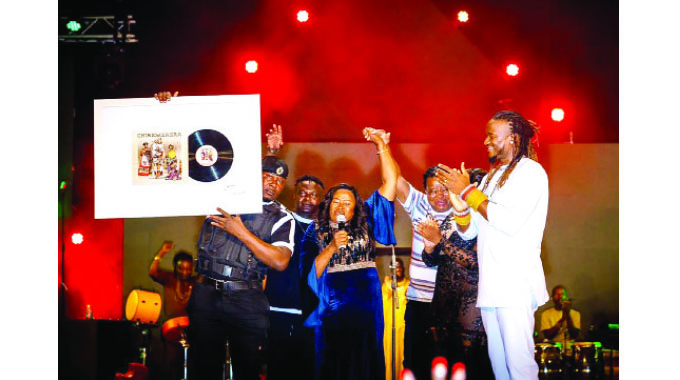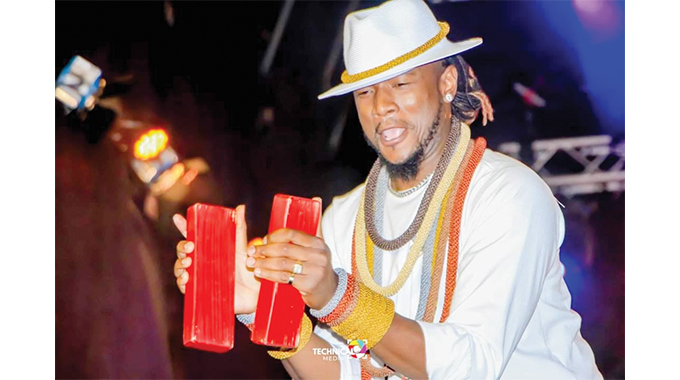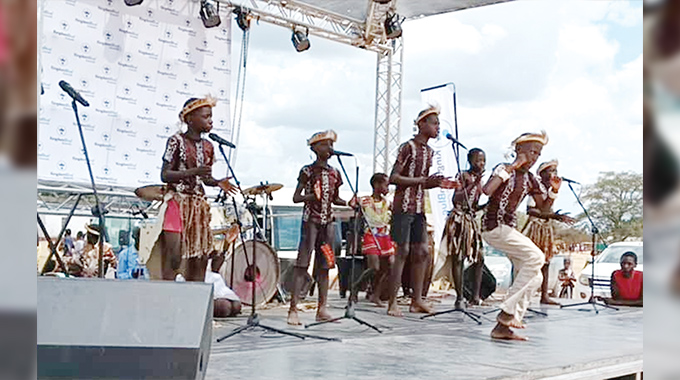Chiremerera unveils Jah Prayzah, the voice of the ancestors

Robert Mukondiwa
A story shall one day be told of a lanky dreamer. Bright-eyed and rural with nothing, but a ridiculous dream of conquering his country, he ended up speaking to the world in the language of the gods. His gods.
One who took the spirits of his ancient gods from the crevices of caves and caverns of Charehwa, Njelele, and Matobo and dragged his gods from their comfort zones, carving out a throne for them among the international pantheon of gods alongside the gods of Olympus, and other realms that had for long, overshadowed the gods of ancient Africa.
A boy who dreamt a dream and named himself Jah Prayzah.
Because you see, what Jah Prayzah did recently when he launched two albums in two days was to bravely wear a coat he had been too coy to wear and claim openly. He turned a corner and became the man he has always dreamt himself to eventually be.
In the album Chiremerera (isithunzi), Jah Prayzah has probably risen to the very essence of the artiste his ancestors wished him to be. They have opened his spiritual eyes in order to make him see who he is and finally answer the question we all ask of ourselves, who are we? Who am I?
What is evident is that Chiremerera is a full-rounded album by Jah Prayzah where he does not fear to claim his mark as the quintessentially traditional music artiste that he set out to be. The sound. The nuances.
The haunting spirit that speaks in the background on each and every song distinguishes him from the pop artiste who sang Gochi Gochi and other feel-good music that had critics labelling him a proponent of bubblegum sound.
Rather, he has grown, nay, morphed into this enigmatic beautiful apparition that connects his people and their ancestry through music and sound.
On every song on this 13-track odyssey, one cannot help but notice that Jah Prayzah has resurrected the dead in perhaps the most beautiful fashion. Sounds and spirits that could only be captured and bottled by artistes like the Legal Lions, Mike Mopo and Zinawa, Zig-Zag band and to an extent, even living griots like Thomas Mapfumo, suddenly are re-imagined and breathed into the sound box that is the modern-day stereo and with a beautiful touch. A modern touch. A brave touch even.
While Jah Prayzah was probably scared of producing a totally quintessential traditional African-sounding album complete with the language of our gods and our ancestors. It is easy to imagine why he had a fear.
In a country of counterfeit Christians, pseudo-religious beings who are in fact extremist fundamentalists and phone puritanical zealots to whom anything is evil if it has ties to the land of our birth, where we put our umbilical cord (rukuvhute rwedu, inkaba yethu) those who love their traditional identity are hounded underground and forced to betray their roots. Their essence.

Jah Prayzah Chiremerera album launch. — Picture by Technical Media
Indeed, a set of thugs masquerading as music critics have started name-calling. Album remashavi. An ungodly album. And yet perhaps this is the godliest album Jah Prayzah has actually produced. For one, he does not reference a voluptuous woman with a huge posterior as he usually does on every other album. Goodness, JP likes them thick! Filling the dresses. Mbambamba.
But also, how godly can one be? Perhaps the one act of pure godly conduct is to look towards those who birthed you and gave you the gift of identity, of language, of melanin and to honour them in a language they understand and thank them for giving you the gift of life.
But Jah Prayzah also has a brief of his alter ego, Mukudzeyi Mukombe.
In the song Chiremerera for example, he is an aggrieved man.
His name, he says, has attracted bad mouthing, and his mistakes are magnified. You all err and sin as I do, he cries, and yet it is my wrongs that are amplified as if you are perfect beings. He is livid. Yet he is belligerent. He has been put in his stead by the gods and he is not going anywhere despite the efforts of his detractors to remove, strip, and tear away his dignity. His Chiremerera!
It is a feeling all of us geniuses know too well. When lesser men look at us and our talents, they wish it were them. They wish they could sing as well as we do. They wish they could act as well as we can. They wish they could write like the spiritual geniuses that we are. And when they see that never in a thousand lifetimes can they be like us, they try and destroy us. Through malice. Through innuendo. Through falsehoods. As if they are perfect beings.
But we are appointed by gods. Our coronation was superintended over by our ancestors. Our gifts, like a sweet beautiful curse, can never be taken away from us. And those that wish us ill may devour our flesh and drink of our blood, but apart from a full belly and red dripping lips, they can never be, or do, what we do.
This is the problem with talent that is associated with fame. The late great Oliver Mtukudzi himself once said he detested the fame that came with the trade of artistes in Mbiri Hurimbo. Because we sit in front of televisions and voices heard on the radio, people claim a stake in you and when they feel the evil urge to destroy your Chiremerera, they know where to find and slander you. While he is livid, Jah Prayzah shows a new side to him. A side most geniuses eventually develop. In essence, they eventually develop a thick skin and stick their middle finger to their enemies. Hence his declaration that he is invincible and inimitable and certainly sits there on this lofty pedestal because of higher beings.
The theme of resilience is one that runs through most of this album. For a man who has fought many battles, it should be no surprise that he talks about war, peace, and belligerence in the face of adversity and strife. With conquering being the ultimate result.
Gonan’ombe, Hasha, Chirege Chiyambuke are all efforts that show the new definition of a new or perhaps well-rounded Jah Prayzah. He had fired the warning shots in Gwara.

Jah Prayzah unveils the album Chiremerera in Harare last weekend with his family
This new album is perhaps a tribute to us, the aged wine bottles in the cellar of life who felt alienated from the up-tempo rhyming Jah Prayzah and instead fell in love more with the Jah Prayzah of Gear and the sacred hymn that is Nyeredzi. Either that or Jah Prayzah himself too, has aged and joined the laid-back more philosophical among us. Either way, the invasion of traditional culture and musical religion into Zimbabwean music itself deserves to be analysed.
We have a garden graced by, by far, two of the best roses to ever come out of our musical garden, Winky D and Jah Prayzah. Both are being hand-held by the spirits.
Both now sing and speak the deep ancient language of their ancestors. Could it be a coincidence that they have become Mukombwe, children of the spirits? Is this a sign from the gods of Zimbabwe? Only time will tell.
There are of course among us, many who will celebrate Chiremerera alongside Eureka Eureka and thank the musical gods for giving us these two human gifts at the same time. Only a true genius has the presence of mind to love them both in equal measure and celebrate them.
For the rest of the empty skulls, the argument shall be who is better. For the genius, the question shall be “What have we done for the gods for them to give us two beautiful gifts such as these in one moon?”
And so in this period and time, the obvious pursuit is to celebrate this beautiful contribution by Jah Prayzah and hope that for as long as their hearts beat to the sound of the African drum, artistes such as this beautiful soul will continue to serve us with sumptuous musical feasts that are fit for kings and courtiers.
Next weekend, we carry an analysis of Jah Prayzah’s second album two entitled Maita Baba.












Comments